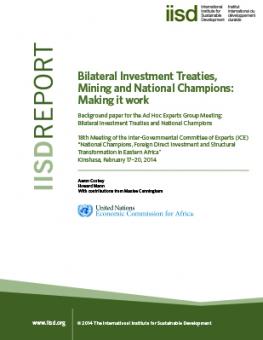
Bilateral Investment Treaties, Mining and National Champions: Making it work
The past decade has seen a surge of national and regional efforts to re-envision the role of mining in East Africa and more broadly in Africa as a whole.
The Africa Mining Vision calls for “transparent, equitable and optimal exploitation of mineral resources to underpin broad-based sustainable growth and socio-economic development.” In the last 10 years most states with significant mineral wealth have revised or have begun the process of revising their national mining codes. The creation of national champions in the Eastern African mining sector is part of the dynamic changes affecting that sector. This paper recognizes the increased importance of national champions and looks at options how mining might best contribute to a range of goals, consistent with the approach taken in the Africa Mining Vision and in various new mining codes drafted by countries such as Angola, Tanzania, Guinea and Mozambique. The paper also focuses on the policy tools available to states interested in pursuing this new vision of mining.
Participating experts
Additional downloads
You might also be interested in
Agreement on Climate Change, Trade and Sustainability: A landmark pact for trade and sustainability
The ACCTS pact, signed by Costa Rica, Iceland, New Zealand, and Switzerland, aligns trade and environmental policies, tackling fossil fuel subsidies, eco-labels, and green trade.
Why the Energy Charter Treaty Modernization Doesn't Deliver for Climate
The Energy Charter Conference adopted the "modernized" Energy Charter Treaty (ECT) on December 3, 2024. IISD's Lukas Schaugg explains what the modernization does, when it will enter into force, its tension with EU law, and why the reformed ECT can still hinder climate policies.
Artisanal and Small-Scale Mining of Critical Minerals
This report examines the potential for artisanal and small-scale mining (ASM) to take an expanded role in the global supply of critical minerals.
Addressing Carbon Leakage: A toolkit
As countries adopt ambitious climate policies, this toolkit examines strategies to prevent carbon leakage—when production and emissions shift to nations with weaker climate policies—and explores the trade-offs of each approach.